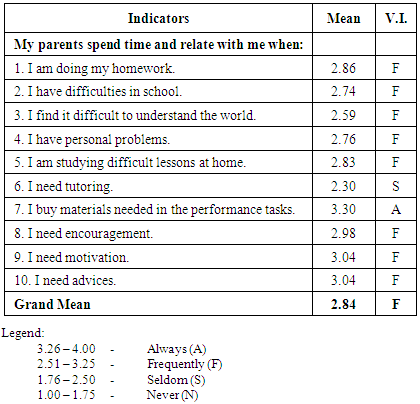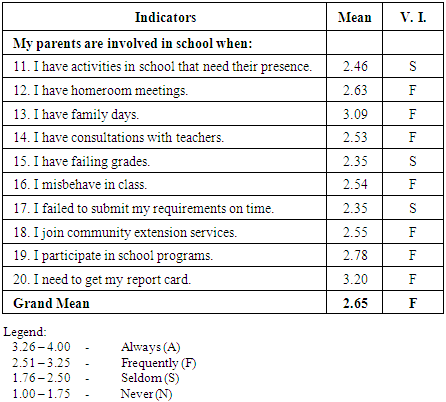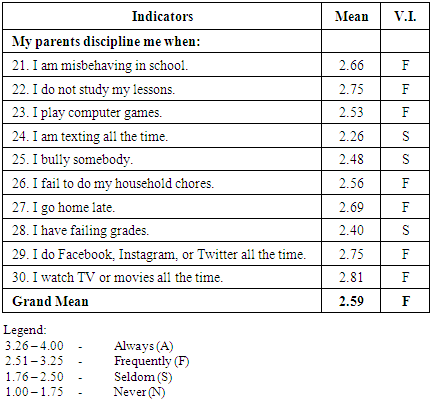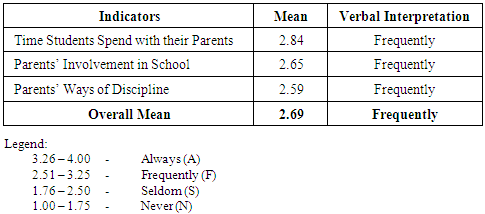-
Paper Information
- Next Paper
- Paper Submission
-
Journal Information
- About This Journal
- Editorial Board
- Current Issue
- Archive
- Author Guidelines
- Contact Us
Education
p-ISSN: 2162-9463 e-ISSN: 2162-8467
2017; 7(2): 22-27
doi:10.5923/j.edu.20170702.02

Students’ Relationship with Parents: Basis for an Action Plan
Cadosales Rosid Benilde Q., Mastofske Mara M., Razonable Jea Ysabelle C., Sabroso Berghnel O., Trinidad Mirenelle UR
La Salle University Integrated School, Ozamiz City, Philippines
Correspondence to: Cadosales Rosid Benilde Q., La Salle University Integrated School, Ozamiz City, Philippines.
| Email: |  |
Copyright © 2017 Scientific & Academic Publishing. All Rights Reserved.
This work is licensed under the Creative Commons Attribution International License (CC BY).
http://creativecommons.org/licenses/by/4.0/

The study described the relationship of parents with their children. Based on the findings of the study, an action plan was recommended. The indicators per category with the lowest rating were considered in the action plan. It was made to suggest interventions to help parents and students have better relationship. Descriptive-developmental research method was used in the study. The descriptive research method was used to determine the profile of students’ relationship with their parents. Developmental research method was used to recommend an action plan addressing the weak areas identified in the study. Researchers-made questionnaire was constructed. It included the time spent by parents with their children; parents’ involvement in school; and parents’ ways of discipline. There were eighty junior high school students who participated in the study. Findings reveal that students value the time parents spent with them in buying materials needed for projects and performance tasks; presence of parents during card distributions; and parents’ way of discipline in the use of gadgets. It was recommended in the action plan that parents find time to tutor their children; encouraging students to submit requirements on time and cope with their failing grades; parents need to discipline their children on the proper use of texting. Parents need to attend sessions that help them motivate their children and on how to spend quality time. It is recommended to strengthen the parents-teachers relationship. School activities involving cooperation with parents and children be strengthen. Other researchers using variables not covered in the study be conducted.
Keywords: Students, Relationship, Parents, Action Plan, Philippines
Cite this paper: Cadosales Rosid Benilde Q., Mastofske Mara M., Razonable Jea Ysabelle C., Sabroso Berghnel O., Trinidad Mirenelle UR, Students’ Relationship with Parents: Basis for an Action Plan, Education, Vol. 7 No. 2, 2017, pp. 22-27. doi: 10.5923/j.edu.20170702.02.
Article Outline
1. Introduction
- Education is important since it is the stepping stone towards a student’s future career. In effective schools, parents understand and support the basic mission of the school. They are given the opportunity to play an important role in helping the school achieve its mission (Bago, 2008). In La Salle University, the parents play a significant role in the academic journey of their child. They are partners of the LSU IS in monitoring and assisting the learning of their children. They are required to report to the school in some scheduled activities like card distribution and family day. As Herman and Herman (1998) reported that parents’ involvement in school resulted to less student absenteeism and tardiness; fewer student discipline problems; fewer student dropouts; increase positive school climate; increase in student graduation; and increase in student achievement scores on standardized tests. The performance of students in school is essential because it describes how they participate in the classroom as summarized in their report cards. The grades are concrete evidences of the learning of the students.There are factors that affect a student’s performance in school. One of which is the relationship with their parents. Quality time with parents is very important for students since it strengthens the bond of a family. If time spent with parents is disregarded, problems may rise. When there is a problem in the family, certain factors may be affected especially a student’s performance in school. The student might be concerned about the problem that he/she cannot focus in school. Parents have their ways in treating their children. The manner that they treat their children could be one of the reasons in the way their children perform at school.
2. Review of Related Literature
2.1. Relationship with Parents
- The relationship between students and parents is affected by the parenting styles practiced by parents. Baumrind (1966) distinguished parenting styles as identifying one as too hard, one as too soft, and one as just right. After studying how children and parents relate in their home, Baumrind came up with three major parenting styles. The researchers believed that parents’ parenting style is shown on how they relate with their children. Students study to achieve good grades. When students study, they can perform well in class. They can get good scores or comply the performance tasks. They succeed in the end. Moreover, the students’ relationship with their parents may encourage them to perform well in school. Parents support their children in school as shown in terms of:(a) time parents spend with their children. According to Parker and Wang (2013), parents who think they spend the right amount of time with their children are about three times as likely as parents stating that they spend little time with their children to say their parenting job is excellent. The time students spend with parents is important because it motivates a student to perform well in school. If the parents spend their time mostly by always concentrating in their work, their children will just have to do things by themselves. They would not want to ask their parents for guidance because they might think that it will add to their parents’ burden. a. Parents’ Involvement in SchoolChild Trends (2013) states that students with parents that are involved in their school tend to have better academic performance. These students perform better in school compared to students with parents who are not involved in their school. Students should receive attention and guidance from their parents. Parents should be aware in the activities their children participate in and praise them whenever they earn an achievement for their children’s hard work to be paid off. (b) Parents’ ways of disciplineBaumrind (1966) came up with three major parenting styles namely, authoritarian, permissive, and authoritative parenting. The authoritarian parent is very strict and expects his/her orders to be obeyed. They show low levels of warmth and responsiveness. It means that they are not attentive to their children’s needs. The permissive parent is not strict at all and does not enforce rules or punishments. Unlike the authoritarian parent, the permissive parent is extremely responsive to the children’s needs. The authoritative parent presents themselves as authority figures. They are loving and caring to their children but they also expect their children to behave. The parenting style employed by the parents affect their relationship with their children. If parents are too strict or too lax to relate with their children, the performance of children in the school might as well affected. Strict parents may hinder their children to share about their difficulties in school. On the other hand, parents who are too lax may tend to have children who had less care about their schooling. On the other note, involved parents tend to have children who are open about their successes and difficulties in school.The literature cited emphasized on the roles of parents in the performance of their children. In general, the above-mentioned literature helped the researchers in coming up with the conceptualization of this present study.
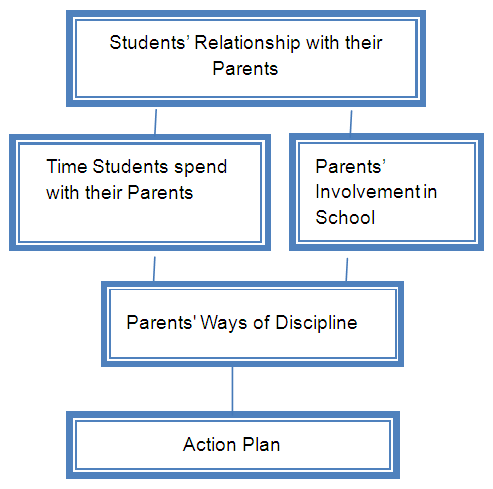 | Figure 1. Schematic Model of the Study |
2.2. Statement of the Problem
- The purpose of this study is to describe the students’ relationship with their parents in terms of time students spend with their parents; parents’ involvement in school; and parents’ ways of discipline. An action plan will be recommended based on the findings of the study. More importantly, the study seeks to answer the following research questions:1. What is the profile of the students’ relationship with their parents in terms of:1.1 time spent with their children,1.2 involvement in school, and1.3 ways of discipline?2. What action plan maybe proposed based on the findings of the study?
3. Method
- This chapter presents the short description of the research design, research locale, sampling technique, the participants, instruments, and statistical treatment.Descriptive – developmental type of research is used in this study. The descriptive method is specifically employed to determine the profile of students’ relationship with their parents. Developmental research is employed to recommend an action plan addressing the weak areas identified in the study.The participants of this study were the eighty (80) students from Grade 7 to 10 enrolled in the Academic Year 2016 – 2017 who were selected randomly. Their ages range from 12 to 17 years old. The researchers-made questionnaire was the main research instrument used to gather the data. The questionnaire was shown to experts for face validity. Suggestions were given to improve the construction of the items per category of the students’ relationship with their parents. The research instrument was used to describe the three categories, namely, time students spend with their parents, parents’ involvement in school, and parents’ ways of discipline. There are ten indicators in each category.The researchers made use of an interview guide. They interview some junior high school students about the indicators with high and low ratings. Each item was scaled 1 to 4 with the following verbal descriptions:
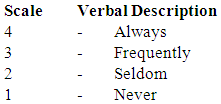 The mean scores were interpreted as follows:
The mean scores were interpreted as follows: Weighted mean was computed to present the profile of the students’ relationship with their parents.
Weighted mean was computed to present the profile of the students’ relationship with their parents.4. Results and Discussions
4.1. Students’ Relationship with Their Parents
- The way students perform in school is somehow influenced by their relationship with their parents. The time spent with parents allows the students to discuss the things they do in school. Parents will understand better on how their children perform in school if they set quality time with them. Regular communication between students and their parents allow them both to solve the problems that might affect the schooling of the students.Table 1 presents profile of the time students spend with their parents.
|
|
|
|
4.2. Action Plan
- Action plan is a sequence of steps that must be taken, or activities that must be performed well, for a strategy to succeed. An action plan has three major elements (1) Specific tasks: what will be done and by whom. (2) Time horizon: when will it be done. (3) Resource allocation: what specific funds are available for specific activities (Business Dictionary).
 Rationale:The term parent-child relationship refers to the unique and enduring bond between a caregiver and his or her child. To understand the parent-child relationship, we must look at the ways that parents and children interact with one another physically, emotionally, and socially (Schissel, 2017). This is the reason why researchers are interested to study about parent-child relationship.The results of the research signify that mass media, parenting involvement of parents and parenting styles affect the relationship of students with their parents. When parents and students share or are interested in the same mass media, it is likely that they will have a common interest to share. Parents involvement in school activities help boost the student’s self-esteem knowing that their parents are supporting them, and finally, parenting styles, contribute to the students’ achievement. The recommended activities are based on the indicators with the lowest mean rating. The activities will be implemented with the concerted efforts of the school administrators, parents’ auxiliary board, student government, and teachers.A. Time Students Spend with their ParentsIndicator: Parents’ Tutoring their ChildrenObjective: Parents will provide assistance to their children who need tutoring.Action Plan: Give seminar to parents on how to tutor their childrenB. Parents’ Involvement in schoolIndicators: Parents Assisting their Children with failing Grades and Parents Motivating their Children to Pass Requirements on TimeObjective: Parents provide moral support to their childrenAction Plan: Give a seminar on parenting skillsC. Parents’ Ways of Disciplining their ChildrenIndicator: Parents’ Awareness on the Proper Use of GadgetsObjective: Parents will be informed on the appropriate use of gadgetsAction Plan: Conduct conference with parents on the proper use of gadgets
Rationale:The term parent-child relationship refers to the unique and enduring bond between a caregiver and his or her child. To understand the parent-child relationship, we must look at the ways that parents and children interact with one another physically, emotionally, and socially (Schissel, 2017). This is the reason why researchers are interested to study about parent-child relationship.The results of the research signify that mass media, parenting involvement of parents and parenting styles affect the relationship of students with their parents. When parents and students share or are interested in the same mass media, it is likely that they will have a common interest to share. Parents involvement in school activities help boost the student’s self-esteem knowing that their parents are supporting them, and finally, parenting styles, contribute to the students’ achievement. The recommended activities are based on the indicators with the lowest mean rating. The activities will be implemented with the concerted efforts of the school administrators, parents’ auxiliary board, student government, and teachers.A. Time Students Spend with their ParentsIndicator: Parents’ Tutoring their ChildrenObjective: Parents will provide assistance to their children who need tutoring.Action Plan: Give seminar to parents on how to tutor their childrenB. Parents’ Involvement in schoolIndicators: Parents Assisting their Children with failing Grades and Parents Motivating their Children to Pass Requirements on TimeObjective: Parents provide moral support to their childrenAction Plan: Give a seminar on parenting skillsC. Parents’ Ways of Disciplining their ChildrenIndicator: Parents’ Awareness on the Proper Use of GadgetsObjective: Parents will be informed on the appropriate use of gadgetsAction Plan: Conduct conference with parents on the proper use of gadgets5. Summary, Conclusions, and Recommendations
5.1. Summary
- The study aimed to find the effect of relationship of students with their parents to their performance in school. The study involved eighty (80) junior high school students enrolled in the Academic Year 2016 – 2017. Approximately, these students aged 12 to 17 years old. Specifically, the study hoped to describe to profile of the students’ relationship with their parents in terms of time students spent with parents, parents’ involvement in school, parents’ way of discipline and students’ performance in school which is measured through their grades. The descriptive-correlational research method was employed to determine the students’ relationship with their parents and their performance in school.
5.2. Salient Findings
- The profile of the students’ relationship with parents showed that:2.1 Parents always spent their time with children when they need to buy materials needed in the performance tasks (3.30). 2.2 Parents frequently get the report card of their children during card distribution (3.20).2.3 Parents discipline their children when they watch TV or movie all the time (2.81).2.4 Time students spend with their parents ranks first with a mean rating of 2.84. 2.5 Parents’ involvement in school ranks second with a mean rating of 2.65.2.6 Parents’ way of discipline is third in the rank having a mean rating of 2.59.
5.3. Conclusions
- Based on the findings, it can be concluded that students value their relationship with their parents. Of the three categories, time students spent with parents had the greatest impact. It can be concluded further that students treasure the time that they are with their parents.
5.4. Recommendations
- In the light of the findings and conclusion drawn from the study, the following are recommended:4.1 Students will be exposed in activities on how to strengthen their relationship with parents like family days.4.2 Parents will attend school activities/ sessions on how to motivate their children.4.3 Teachers will conduct consultations with the parents.4.4 The school will strengthen the activities that involve the parents.
 Abstract
Abstract Reference
Reference Full-Text PDF
Full-Text PDF Full-text HTML
Full-text HTML